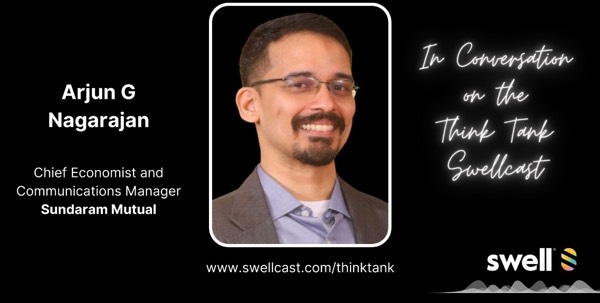
@ThinkTank · 1:30
Unpacking the Global Economic Slowdown: What do we need to know? In Conversation with Economist Arjun G Nagarajan
We're witnessing a turbulent period in terms of economic growth globally. There have been job losses in several key sectors and countries, especially in Western Europe and the United States have been contemplating various policy maneuvers to weather the storm, as it were. And some of these policy moves, especially with regard to interest rates and lending, are being discussed widely across various international forums to manage the slowdown

Arjun Nagarajan
@arjungn80 · 5:00
The answer is no, because growth is at a much better phase. Bank assets are also doing fairly well, and there aren't any concerns about a recession as much

@ThinkTank · 1:08
The Indian economy has seen corrections in terms of stock prices of several key companies, especially in the first quarter of this fiscal. Given the global situation, what is your overall read on the economy and how it's doing in this particular context? Arjun and this is taking into account all the parameters that we traditionally look at, which as FDI, employment, oil prices and all of that

Arjun Nagarajan
@arjungn80 · 5:00
The last time it was this fast, it was probably in the 1970s, and in the 1970s, the economy responded to such rate hikes with a recession. Now there's definitely going to be a drop in growth, an appreciable one, but we still don't really think that it's going to turn out into a recession of sorts. I think that is the most important point that we need to keep in mind. And the Federal Reserve is very cognizant of this

Arjun Nagarajan
@arjungn80 · 3:01
And probably, I think if I were to hazard a guess, I think at 6.5% repo rate, the RBI should possibly pause here and would probably stay at 6.5 for the whole of FY 24, the fiscal year till around March 2024. At least, that would probably be my guess. But this guess assumes that there isn't any new growth scare, globally or domestically

@ThinkTank · 0:44
And on that note, I'd like to open this conversation up, so if anyone has any questions, please do post them after my response. Arjun, once again, thank you so much. It's been wonderful having you on Swell. I've had a lot of fun getting to know you and connecting with you on this interview and offline as well. I look forward to having you back very soon on swell

Sudha Varadarajan
@sudha · 3:10
There is so much that the US. Can do from an economic growth perspective. And so I think there is a fallacy in pursuing the inflation number. And the reality is we need to be pursuing a higher GDP rather than a lower inflation number. What do you think about that? Because I also look at it historically. Look at what FDR did. FDR came at a time when it was actually the US. Was in deflation
Swell Team
@Swell · 0:15

Arjun Nagarajan
@arjungn80 · 5:00
It's just a question of how fast inflation picks up with the first category of government spending against the second. Now coming to central banks. Now, why does a central bank care to address inflation? I think it goes to be Cliched answer. They don't want the economy to go into a state where they allow prices to go up and you need boxes of money to buy a loaf of bread. The cliched answer, but the more important answer

Sudha Varadarajan
@sudha · 2:56
There has to be a lot of thought given to also the other number, which I look at as a numerator denominator kind of play here, saying, hey, one way to bring down a number is I either increase the denominator, which is increasing the interest rate, or increase the numerator, which is increasing GDP growth rate. Right? And I sincerely believe that there is no thought given by legislature to its responsibility in this. They have a legislative responsibility to bring about policy to improve GDP growth rate

Arjun Nagarajan
@arjungn80 · 4:57
But it will take a very long time for those changes to actually translate into something on the ground and for it to ease inflation. So the only tool, and the fastest tool that one has is to raise rates, curb activity and bring inflation down. So the route that you're talking about, I think it's a very legit question, but the only problem from a practical policy point of view is that it takes a very long time for that to bring inflation down

Arjun Nagarajan
@arjungn80 · 1:38
Because if they do not really bring down inflation by raising rates and bringing down demand, though demand is actually not the reason, the main reason. If they don't do that, you will have prices remaining in the system elevated for a longer period of time, longer than the comfort for a central bank. And goes back to that cliched comment. If it continues, you have this hyperinflation narrative that could come through stagflation that could come through. I'm just extending the argument
